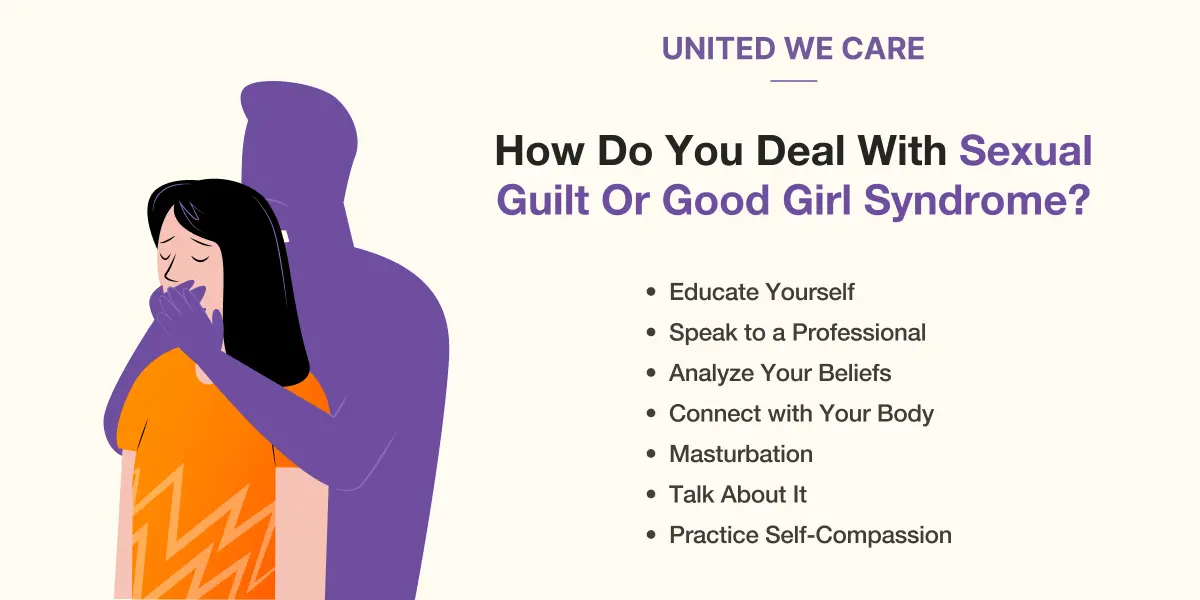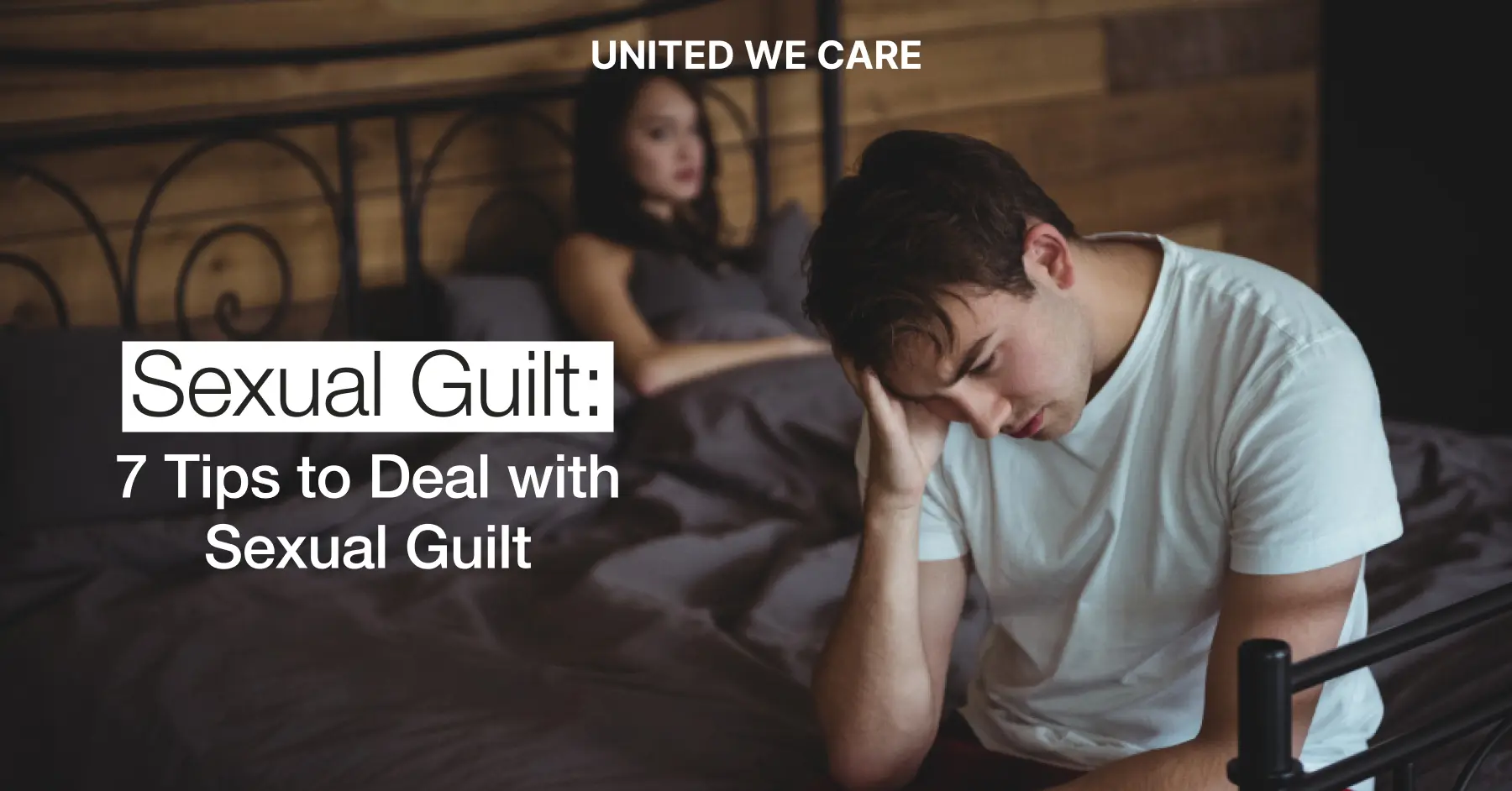Introduction
Sexual guilt is a recurring experience of intense shame and guilt for wanting to engage in sexual activity. It can cause a person to avoid sex, or talking about it, or even feel self-hate and contempt for sexual activity. Naturally, it’s not a pleasant experience, and when it is a chronic issue, it can seriously impede well-being and healthy functioning.
In this article, we’re going to discuss in detail what sexual guilt is, how it looks, what causes it, and what to do about it.
What is Sexual Guilt?
Psychologically, sexual guilt is defined as a negative emotional response associated with feelings of angst, shame, and self-blame. This emotional response may occur when a person thinks about sex, participates in it, or talks about it with someone.
In fact, sexual guilt may cause a person to miss out on a better quality of life as it impacts interpersonal relationships and self-image. One might also be vulnerable to situations of abuse or lead an unsatisfactory sex life due to the shame of talking about sex openly.
Symptoms of Sexual Guilt
In this section, we’re going to describe some of the signs and symptoms of sexual guilt. If you or someone you know displays any of these, sexual guilt could be a probable cause.
Uncomfortable Feelings About Sex
First of all, anyone with sexual guilt will typically struggle to talk about sex openly. This is because any conversation related to sex may bring up unpleasant feelings of shame, guilt, and anxiety.
Due to a lack of awareness and society’s stigma related to sex, people may not have the necessary skills to process such emotions. In their absence, it becomes easier just to avoid the topic as a whole. Some may even end up judging or prejudizing against those who speak freely about sex.
Feelings of Inadequacy
Secondly, when a person experiences sexual guilt, they may also develop certain insecurities related to intimacy, connection, pleasure, and body image. Normally, this happens because there is a clash between the body’s natural need for sex versus the pressure of sexual guilt.
Furthermore, this clash makes it hard for a person to practice authentic self-acceptance. Consequently, they may suffer from feelings of inadequacy. Typically, this may manifest as a defense mechanism to avoid acknowledging thoughts, feelings, and behaviors related to sex.
Trouble with Intimacy
Another symptom of sexual guilt can be intimacy issues. If a person experiences shame related to sex, they may struggle to connect with someone they are romantically attached to.
There may be a mismatch of expectations and needs within the relationship, leading to conflict and disappointments. The individual may also end up avoiding close relationships and, hence, feel pretty lonely and isolated.
Difficulty with Orgasm
Lastly, sexual guilt can cause a person to have difficulty with orgasms. If you have trouble climaxing or you can only do so under specific circumstances, it could be because of sexual guilt.
As the act of sex brings up difficult emotions of shame and apprehension, it interferes with the process of orgasm. You might also experience guilt after a few hours or days post-orgasm.
Causes of Sexual Guilt
Now that we have described how sexual guilt shows up in our lives let’s discuss what could be causing it.
Cultural and Family Beliefs
One of the most common causes of sexual guilt is the influence of the beliefs held by the people around us. Growing up, we might have inculcated certain thoughts or ideas about what sex is and who indulges in it.
Looking at sex beyond the lens of procreation is often judged as loose and immoral. This could stem from an anti-hedonistic way of living life. On the other hand, it can also be caused by a patriarchal system that focuses on controlling women. Whatever the context, if our family and society disapprove of sex, it could cause sexual guilt.
Religious Influences
Sometimes, a community’s beliefs about sex come from religious attitudes imposed by the leaders of that religion. For example, some religions strongly believe that sex is only meant for reproduction. Therefore, doing it outside of marriage or for pleasure is seen as a sin.
Additionally, there are also some religious beliefs on sexual activity beyond the heteronormative ways of doing it. People might develop sexual guilt for having kinks or specific preferences in sex that are looked down upon by the community.
Internal Conflict and Moral Dilemma
A person’s own beliefs about sex are also a typical cause for sexual guilt. While most such beliefs come from one’s upbringing, one might also develop certain beliefs based on choice. If sex is seen as something immoral or if anything apart from a certain kind of sex is against your values, you might experience sexual guilt.
This is stronger if, due to impulsivity, addiction, mental illness, or unspecified reasons, you end up doing something sexual that doesn’t fit your beliefs. Often, people experience this kind of sexual guilt when they are experimenting or trying something unfamiliar.
Past Trauma
Finally, another solid cause of sexual guilt is when a person has a history of sexual trauma. This is even more so if the sexual abuse occurred in childhood. In such cases, any stimuli related to sex may bring up unprocessed or unhealed memories of the abuse.
Unable to deal with the trigger and the resulting traumatic reaction, the person may experience a deep sense of helplessness, shame, and guiltt.
Effects of Sexual Guilt
Apart from the negative emotional experience of sexual guilt, there is further damage that this kind of shame can cause. Let’s take a look at some of these effects of sexual guilt.
Sexual Repression
As mentioned above, when a person goes through sexual guilt, they have difficulty accepting certain sides of themselves. Biologically and behaviorally speaking, sex is an integral part of the human experience. When you deny yourself sexual indulgences due to sexual guilt, you do yourself a disservice.
It causes an internal conflict, also known as sexual repression. This can be extremely distressing as it is exhausting and anxiety-inducing to fight a natural bodily drive.
Poor Mental Health
As a result of such repression, an individual is bound to undergo mental health issues. Initially, it may be limited to anxiety and stress, but over time, sexual guilt may even cause moderate to severe mental illness. Some of the psychological disorders that may develop due to sexual guilt include personality disorders, neuroses, and even psychoses.
Interpersonal Issues
Understandably, a person with sexual guilt will struggle to find and maintain healthy romantic relationships. Sex is an essential part of most romantic situations. If you cannot accept your sexual desires and thoughts, it will be hard for you to be intimate with another person.
In addition to that, you might also experience a strain on other relationships where you feel insecurity because of the sexual guilt. You might judge others or be judged yourself because of this emotional problem.
Missing Out on Benefits
Over and above all these effects, since the sexual guilt will hold you back from a healthy sex life, you’ll miss out of the benefits. Research shows that having an active and healthy sex life has several health advantages. Some of these include longer lives, better cardiovascular health, and positive mental health.
How do you Deal with Sexual Guilt or Good Girl Syndrome?
So, is there anything that can be done for sexual guilt? Yes, of course! You might have also heard the term “good girl syndrome” being used interchangeably for this condition. That’s because most people who have sexual guilt are women. Their guilt is centered around the false belief that it is immoral or characterless for a woman to want sex.

The following are 7 tips to deal with sexual guilt and to get rid of this good girl syndrome.
Educate Yourself
First and foremost, you need to do a deep dive into information about sex. This can be from a biological, anthropological, sociocultural, or even subjective point of view. You need to explore and try to look at sex from as many perspectives as possible.
It is ideal to look for reliable sources based on scientific research to avoid misinformation. The book Come As You Are by Emily Nagoski is a great place to start. The more you know about sex, the less you will be scared of it.
Speak to a Professional
You can reach out to doctors, therapists, counselors, intimacy coaches, and sex educators to gain high-quality, verified information about sex. This will help you steer clear of biases.
Getting therapy for your sexual guilt is also a viable option, as it will allow you to dig deeper and discover the roots of your problem. Therapy is also a great place to challenge long-held and firm beliefs in a safe space.
Analyze Your Beliefs
Once you learn more about where your beliefs come from, you will be in a better position to analyze them. You can consider whether these beliefs are serving you or taking away value from your life. If they are unhealthy or unhelpful, you can deliberately choose to discard them and hone a new mindset that is more helpful.
This step will also make it easier for you to see whether you agree with the influences that shaped your sexual guilt. It might turn out that you will start seeing more unrelated things that you disagree with.
Connect with Your Body
It is absolutely necessary for you to connect with your body if you want to overcome sexual guilt. This is for two reasons. The first is that in order for you to enjoy sex without any guilt, you need to know what your body likes or dislikes. You also need to know how to make your body feel safe.
The second reason is that usually, feelings like anxiety, guilt, and shame do not pass unless you are able to recognize how they make your body feel. As your connection and awareness of your body will grow, it will become easier to process your emotions.
Masturbation
In continuation with the previous point, as you connect with your body, you will also learn about your pleasure centers. You will grow an awareness of your turn-ons and turn-offs and how your brain plays a major role in it all.
Once you can learn to treat your body with physical and sexual intimacy, you will be more prone to accepting all of you, even your kinks.
Talk About It
Remember, you are only as sick as your secrets. If you want to be free from sexual guilt and liberate yourself from this shame, you need to voice things.
You need to be able to talk freely about sex, your preferences, your boundaries, etc. Only when you start talking about sex and your sexual guilt in an honest and inhibition-free way, can you overcome the guilt.
Practice Self-Compassion
Underneath all that shame and guilt is a vaccum of self-compassion. If you can learn to be kinder and gentler with yourself, you can successfully fight any kind of guilt. Similarly, your sexual guilt will only lift if you start criticizing yourself less and focus more on your growth.
Conclusion
Sexual guilt is a real psychological phenomena involving a negative emotional response to stimuli associated with sex. It is common in women and consequently referred to as good girl syndrome.
There are several causes to sexual guilt and the effects can be quite pervasive and long-lasting. Sexual guilt can compromise both emotional and physical health. Nevertheless, it is possible to overcome these feelings of guilt and shame, and to improve your sexual health. Talk to our experts at United We Care to learn more!
References
[1] Pelletier, L.A. and Herold, E.S., 1988. The relationship of age, sex guilt, and sexual experience with female sexual fantasies. Journal of sex research, 24(1), pp.250-256.
[2] Mosher, D.L. and Cross, H.J., 1971. Sex guilt and premarital sexual experiences of college students. Journal of Consulting and Clinical Psychology, 36(1), p.27.
[3] Morokoff, P.J., 1985. Effects of sex guilt, repression, sexual” arousability,” and sexual experience on female sexual arousal during erotica and fantasy. Journal of Personality and Social Psychology, 49(1), p.177.









